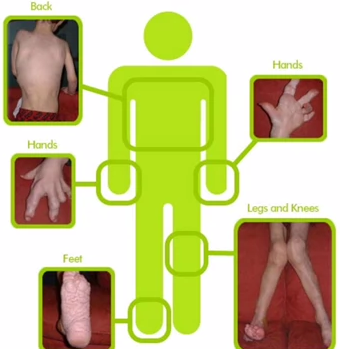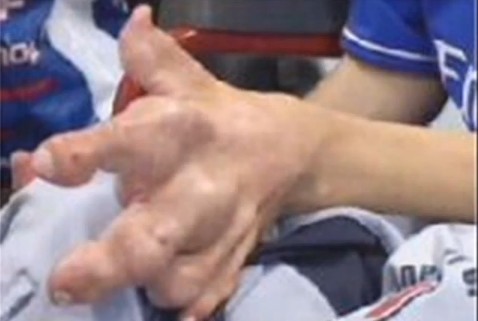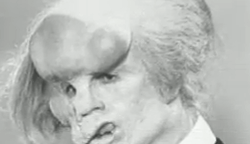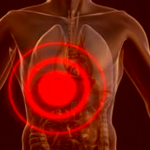Proteus syndrome is an extremely rare disorder that causes overgrowth problems. Such overgrowth can lead to distinct differences in the development of the different body parts. It is important to note that such overgrowth is generally not symmetric and may affect the growth body parts in different ways.
The name Proteus refers to the Greek god of change. Since Proteus syndrome results in ‘changes’ in the form of the various body parts over a period of time, this name was chosen for the disorder.
Symptoms
Proteus syndrome causes overgrowth of various parts of the body. Some of the signs and symptoms of Proteus syndrome as per the body part affected are discussed below:
- Since birth, the shape of the skull may be irregular and the limbs may be abnormally deformed which include the digits as well. The bones as well as soft tissues are affected by the overgrowth abnormalities associated with Proteus syndrome.
- Lung conditions that restrict its functionality as well as cystic lung disorders may occur. Such lung abnormalities will in turn result in breathing irregularities, decrease stamina for physical activities and chronic instances of pneumonia.
- Excessive enlargement and focal atrophy may lead to an extended thorax and an extremely thin neck. The muscles of the upper arm may wither away and there may be muscular hypertrophy of the thighs
- There may be abnormalities of the skin such as increasingly pigmented patches of skin, lipomas, vascular defects, lesions often accompanied by non-malignant tumors and connective tissue nevi of the feet soles as well as other body parts may also occur
- On occasions, individuals affected by Proteus syndrome may experience kidney and bladder dysfunction.
- There may be presence of unique facial features such as drooping upper eyelids, an upturned nose, a distinct shape to hind portion of the head and a long and slim face.
- The outer ear canal bones may undergo increased overgrowth
- There may be abnormal vertebral growth which can result in Scoliosis, i.e. irregular curvature of the spine
- Certain organs may also experience abnormal growth.
- Proteus syndrome patients may also suffer from seizures or fits
- One of the major drawbacks of Proteus syndrome that affects the effective function of an affected individual is the deficits in leaning as well as intellectual defects that can lead to mental retardation.
- Increased weight of the body as well as abnormal growth of bones and body parts can result in painful muscles and/or arthritis
- Another debilitating result of overgrown limbs is the fact that the patients may find it increasingly difficult to perform even the most basic tasks such as walking, writing, dressing, finding proper shoes, eating, holding objects, etc.
Causes of Proteus syndrome
The cause of Proteus syndrome has troubled the medical community for many decades due to its rare nature. It is not until recently that the exact cause of the disorder was known.
It is important to know that the Proteus syndrome is not caused due to any activity of either parent before or during pregnancy; neither is it caused due to exposure to environmental factors before or during pregnancy.
Proteus syndrome is caused due to the mutation or mosaic alteration of a gene known as ‘AKT1’. A mosaic alteration of a gene is different from general mutation. All of us know that our body is composed of millions of cells. Each of these cells has the genetic code within them that instructs each cell of its particular function. In mosaic alteration, this genetic code changes in certain cells in some parts of the body, while it may not change for cells in other parts of the body. This is what causes the asymmetrical abnormal overgrowth that is so characteristic of Proteus syndrome.
The AKT1 gene is responsible for the production of a particular protein that is involved in growth of cells. This protein interacts with various other proteins to arrive at a conclusion about whether the cells should rest or divide and grow or die off. In patients of Proteus syndrome, the AKT1 gene has some abnormalities (mosaic alteration) that prevents the cells from dying a natural death and instead excessively promotes the growth of cells. This is what causes the overgrowth.
Proteus syndrome Treatment
There is no one particular treatment for Proteus syndrome, as it can produce a number of symptoms. Hence, the treatment is based on the symptoms and may involve a number of specialist doctors.
- Dental anomalies need to be checked and corrected by a dentist
- All bone and physical irregularities need to be corrected via surgery
- Learning disabilities and intellectual deficits need to be treated via psychotherapy and other cognitive therapies
- Skin abnormalities may be treated via laser surgery or via other techniques as recommended by a dermatologist
- The different symptoms of Proteus syndrome may be alleviated by the use of various prescription drugs
- Cranial abnormalities need to be corrected by a neurosurgeon.
Proteus Syndrome Pictures






